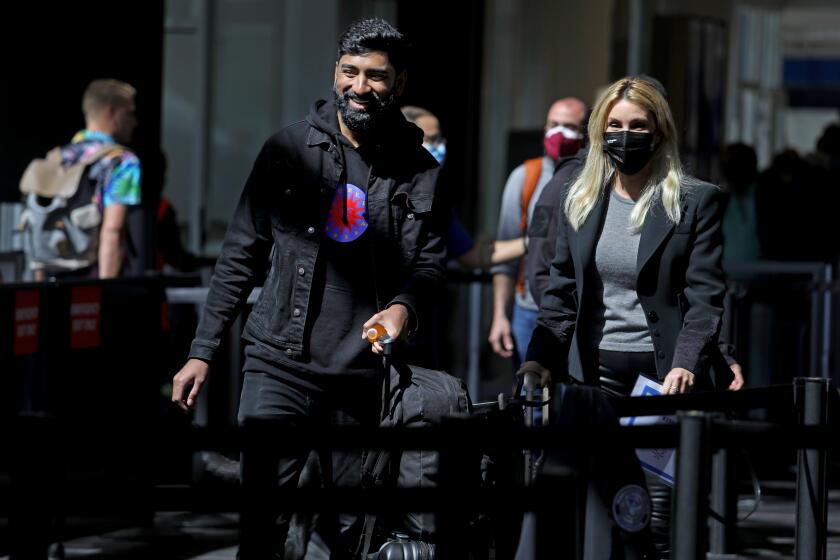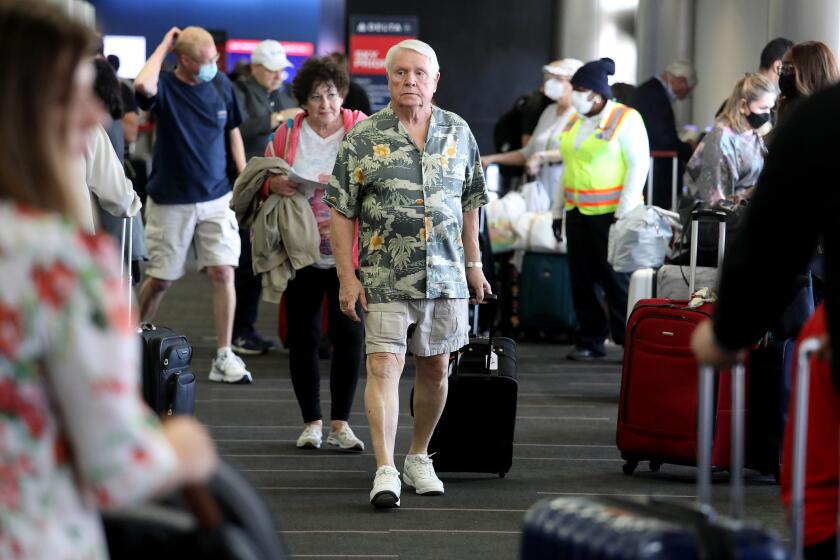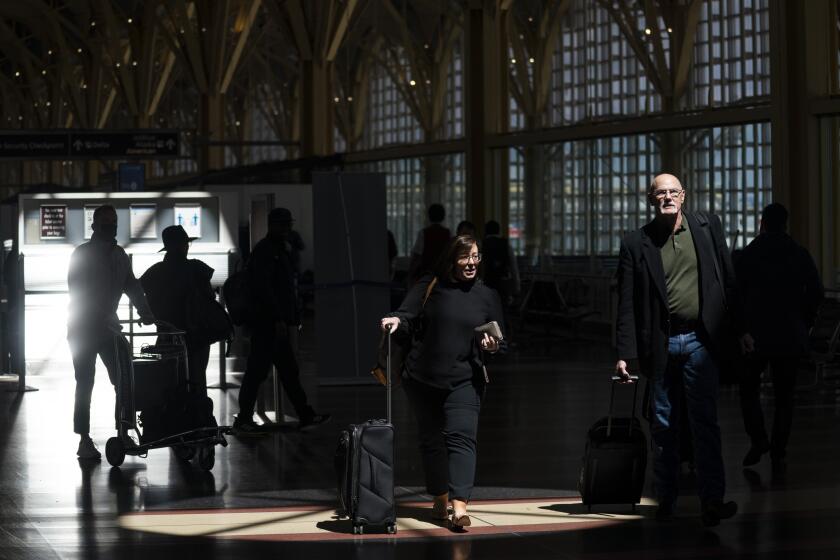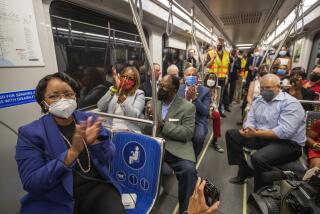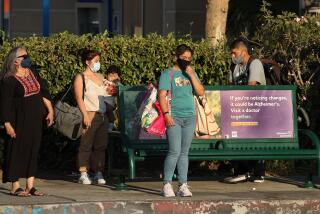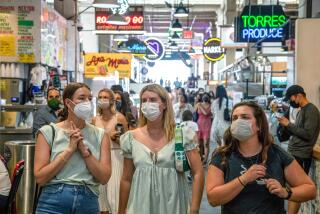Mask-optional public transit alarms immunocompromised people and their families
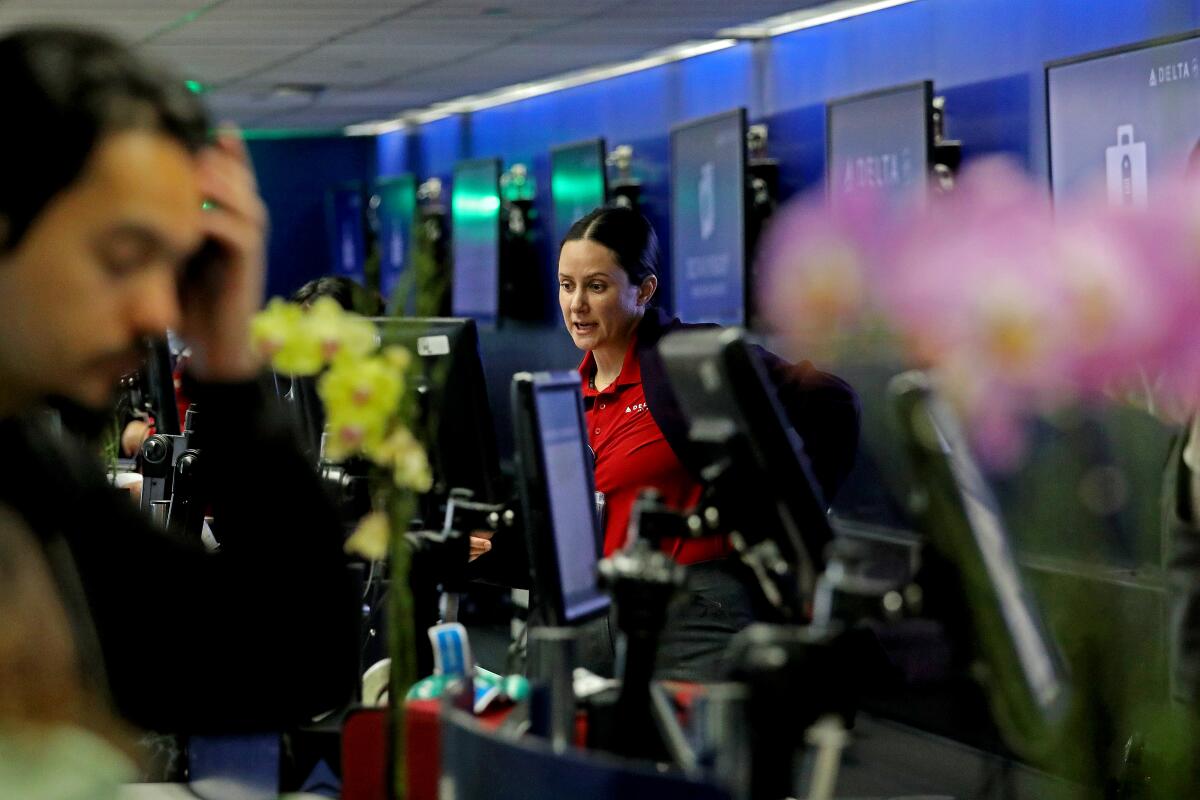
Among those who were alarmed at a federal judgeâs decision this week to lift the mask mandate in airports and on planes, trains and buses are immunocompromised people and their families.
Many medically vulnerable people are now questioning whether to go through with plane trips and are worrying how to navigate public transportation after a federal judge struck down the U.S. Centers for Disease Control and Preventionâs order requiring masks on public transportation.
The decision, which the Justice Department is appealing, troubled disability advocates, who said it has dire implications for a broad group that relies more heavily on transit.
âMany disabled people â including myself â do not drive,â said Maria Town, president and CEO of the American Assn. of People With Disabilities. âWe either have to take public transit to get around or ... we rely on someone else to get us from place to place. And the only way that we can do that safely right now is if mask mandates are in place.â
Welcome to the mask-optional phase of the pandemic. It brings freedoms and risks
The court ruling will mean âtwo realitiesâ: Some disabled people who are at high risk from the coronavirus will be forced to stay home to protect their health, while others who go to work in grocery stores, shops or other jobs where they cannot work remotely will be forced to face an increased risk of getting infected on public transit, Town said.
âWe have fought so hard for the right to exist in our community,â she said, âand now to have these mask mandates fall, which will make it even harder for us to do so, is just infuriating.â
In Los Angeles, Paul and Angie Cibis used to enjoy trips to far-flung spots like Istanbul and Copenhagen before the pandemic descended â and they had hoped to do so again in the future. Now, that idea seems much riskier.
âItâs tough having to see those dreams deferred for another who-knows-how-long,â said Paul Cibis, 42, who is immunocompromised because he received a kidney transplant and takes medication that suppresses his immune system.
If he wears a mask in an enclosed space such as an airplane but hundreds of other people do not, âit ceases to be as effective,â he said. âYouâre sitting there, stewing in everything that everyone else is breathing out.â
Many experts stress that face coverings still protect against the coronavirus and that masking up makes sense â even if itâs no longer mandatory.
The couple also lives a short walk from a Metro stop, but âit just seems like too much of a risk for me at this point,â Cibis said. In Southern California, Metrolink and L.A. Metro are among the transit operators that have said theyâre making masks optional for passengers. Cibis said he is fortunate to be able to work remotely, but he worries about those who cannot.
To Angie Cibis, who has been cautious about her own exposure to protect her husband, the Florida court ruling feels like âconfirmation that people really donât care.â
Many people say they do, but abandoning a safety measure and taking a step âthat really endangers the lives of other people â it just kind of blows my mind,â she said.
âPeople really want this to be over and trust me, we do too. But I think there is a lot of denial ... that even a mild case has severe implications for anybody, and particularly the immunocompromised.â
Mondayâs ruling makes masks optional aboard trains, buses and airplanes. But some transit agencies and facilities are still urging residents to voluntarily mask up.
In West Virginia, Emily Whittington has been waiting to learn whether her 4-year-old son, Jeremy, will get a chance for a coveted form of intensive therapy in Texas. Her child was born with a rare genetic mutation that affected his brain and causes epilepsy.
He is too young to get vaccinated against COVID-19, and sensory issues make it difficult for him to effectively wear a mask, which often slides off his nose because he tugs at it and opens his mouth wide.
After airlines rolled back their mask rules, Whittington and her husband began trying to figure out whether they could make a 17-hour drive to Texas if a spot opened for Jeremy. It could be hard for her husband to take time off work, she said, and making the drive alone with Jeremy might be onerous. She wonders whether they will have to turn down the opportunity.
âI donât even want to think about how to say no,â she said, âbut weâre in a position where maybe weâll have to say no.â
The Justice Department says it will not appeal a ruling that ended the nationâs mask mandate on public transit unless the CDC believes the requirement is still necessary.
âIf no one else is masking, heâs just completely vulnerable,â Whittington said of her son.
And in Seattle, Shannon Reynolds had been planning to take her 2-year-old son, Haddon, to Germany for a chance to get him vaccinated against COVID-19.
Haddon takes medications that suppress his immune system to treat an inflammatory condition, which makes him especially vulnerable to the coronavirus, his mother said.
With few treatments available for very young children, Reynolds had been eager to get him COVID-19 shots, which have been given âoff labelâ to younger children by some physicians in Germany.
âBut we canât get there without a plane,â Reynolds said, âso we probably wonât be doing that.â
Rolling back mask rules on public transit, in turn, leaves her worried about getting to one of the hospitals where her son goes for appointments. Reynolds said she may opt for telehealth appointments instead, even though the care will be less thorough.
âThey canât check his heart. They canât check his circulation or anything like that,â she said. âBut it makes me feel safer that he wonât be exposed to a lot of people.â
When she saw the news about the ruling, âI felt my stomach drop,â Reynolds said.
More to Read
Sign up for Essential California
The most important California stories and recommendations in your inbox every morning.
You may occasionally receive promotional content from the Los Angeles Times.
